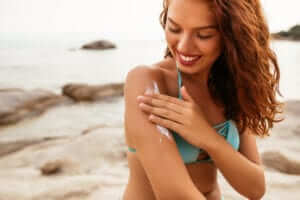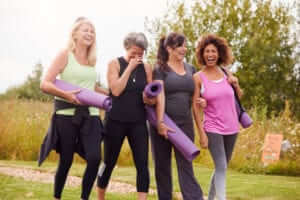Anxious to get into the full swing of summer? You’re not alone if you’re craving some relaxation and warmth, plus BBQ’s and bathing suits.
Summer months can also bring some harsh effects of late nights, lots of sun exposure, and indulgences that can leave us feeling depleted, bloated, and spread thin.
Practice these integrative wellness tips to stay protected, energized, and at a healthy weight all summer! Plus it might actually be easier to lose a little bit of weight in the summer–and we’ll tell you why!
Take care of your skin.
Exfoliate. Exposure to the sun, wind, and dry air can create a buildup of dead skin cells on the skin’s surface. Gently removing dead skin allows products to penetrate deeper and more easily into skin, making them more effective and helping to protect your body’s natural barrier.
Don’t overdo it though, according to our CentreSpringMD spa estheticians say. About 2-3 times per week is sufficient, and make sure to use a product that’s well suited for your skin type.
Moisturize. Our skin is actually our largest organ, and it’s very important we maintain healthy skin at every level. Replenishing moisture that gets stripped away during the warm summer months is essential for supporting skin elasticity and oil balance on the skin.
Drinking plenty of water, increasing omega 3s, and staying consistent with a high-quality day and night cream is key.
Talk to an esthetician for our favorite recommendations for glowing, dewy summer skin!
Protect
If you haven’t stocked up on sunscreen yet–it’s that time! (And don’t forget facial sunscreen as well, for your more delicate skin) It’s important we get vitamin D from the sun–that’s true, but staying out in the sun for long periods of time can do much more harm than good if we’re not properly protected.
A broad-spectrum sunscreen with an SPF of 30 or higher is sufficient, but don’t forget it’s also important to cover up, and seek shade when you can (1).
Vitamins C and E can be found in topical serums, plus are antioxidants and powerhouses for protecting the skin from oxidative damage from the sun.
Lutein, found in greens, beets, papaya, and egg yolks, sits in the lipid layer just beneath the skin, helping to support the elasticity and cellular health of the skin.
Collagen, which is the most abundant protein in the body, naturally declines as we age, and that contributes to poor skin health. You can also find collagen in joints and connective tissues, acting as a kind of “glue” that holds us together!
Be mindful of alcohol consumption.

There’s going to be plenty of chances this summer for backyard BBQ’s, summer fiestas, and poolside celebrations. Don’t misunderstand, it’s important to indulge sometimes and do what feeds your soul, but do so in a way your health won’t be sacrificed later.
If planning to drink, follow each one with a tall glass of water, and keep in mind support for your detoxification pathways–especially for the liver!
If you’d like to sip on a refreshing mocktail, you still get to have a festive drink in your hand, but none of the ill after-effects (or as many calories) as alcohol!
Integrative Wellness for summertime weight loss
Ice cream on the porch, strawberry shortcake in June, and popsicles by the pool. Who doesn’t love those crisp, refreshing desserts that only warmer temperatures can bring?
As always, finding the “sweet spot” between healthy indulgence and overdoing it is key. Use
those treats as times to enjoy and socialize with friends and family, but be mindful of their frequency, as too much sugar can wreak havoc on inflammation, blood sugar levels, and your waistline.
In warmer months, appetites are naturally a little lower thanks to the interaction between temperature, your hypothalamus, and the hunger hormone, ghrelin (2). You may feel more thirsty than usual, and that’s perfectly normal. This is an opportunity to listen to your body, provide the hydration you crave, and fill up with an abundance of lighter fare.
If you like a cool summer smoothie for morning breakfasts, take a look at one of our favorites that packs an antioxidant punch, while helping to support digestive health.
Take precautions
Lyme disease is becoming an epidemic in certain counties in the U.S. and is rapidly spreading to surround areas via ticks and infected animals. Classically, symptoms of lyme disease are fatigue, flu-like symptoms, fever, and sometimes a round, bullseye-shaped rash around the bite.
 The bacteria that causes lyme disease, Borelia Burgdorferi, was thought to be an acute infection that was easily cleared with antibiotics, but recent research is now suggesting that anywhere from 36-63% of cases result in post-treatment lyme disease (PTLD), or chronic lyme disease (4).
The bacteria that causes lyme disease, Borelia Burgdorferi, was thought to be an acute infection that was easily cleared with antibiotics, but recent research is now suggesting that anywhere from 36-63% of cases result in post-treatment lyme disease (PTLD), or chronic lyme disease (4).
This results in a myriad of continuing symptoms that disrupt daily activities and cause many misdiagnosis, if even caught at all. PTLD isn’t well understood yet, and the disease is particularly damaging to children’s neurological systems.
To prevent tick bites, and to promote prompt response to a tick:
- Avoid tall grass, hike in the middle of trails
- Bathe or shower after camping or spending time outdoors in possible tick areas
- Have a family member do a tick-check on areas of your body you can’t see as well
- If you find a tick, you can attempt to gently remove it yourself, following general tick-removal guidelines.
- Contact the clinic as soon as possible to rule out the possibility of Lyme, and to be proactive as possible.
- Use human- and pet-safe pest repellants.
Heat stroke or hyperthermia
Ask anyone who’s suffered from heat stroke or overexertion, and they’ll be quick to tell you they’re not eager to repeat the experience. Fortunately, there are a few basic guidelines to protect yourself, and your family from an entirely preventable medical event.
- Avoid strenuous activities in the hottest part of the day
- Replenish fluid and electrolytes
- Wear loose-fitting, light-colored clothing to protect from the sun
- Don’t drink alcohol to excess–this affects the body’s ability to regulate temperature
Heat stroke can happen quickly, and to anyone. Watch for:
- Slurred speech, confusion, agitation
- Nausea or vomiting
- Rapid breathing
- Headache
- Racing heart rate (3)
Functional Medicine & Immune Health
Many of us are eager to put the current health crisis behind us, but as the world and social gatherings resume, we need to remain vigilant against the threat of a resurgence in cases.
This means wearing a mask where necessary, practicing excellent hygiene habits, and continuing to support a robust immune response. 
Vitamin D not only plays a major role in immune modulation, but also supports mood, inflammation, and healthy blood pressure levels (5).
Vitamin C has powerful antioxidant potential, both inside the body and out. Protecting the skin from damaging rays, and supporting the health of the body on a cellular level (6).
Viracid is our favorite when the immune system needs extra support, with a comprehensive blend of synergistic nutrients and herbal extracts.
Beta-glucans and other polysaccharides in mushrooms play a broad role in health, modulating immune function, supporting cellular health, AND amazing things like promoting a calm mood (7).
Keep moving for better energy.
With more daylight, and a greater number of hours able to be spent outside, summer is a great time to begin or get back into an exercise routine.
 Being outside even shows a strong connection to improved mood, and reduced stress and anxiety (8).
Being outside even shows a strong connection to improved mood, and reduced stress and anxiety (8).
Ideally, aim for 2 ½ to 5 hours per week of moderate activity, spread out over several days. Moderate activity includes brisk walking, light calisthenics, and some yoga flows. Studies also show 75 minutes per week of higher intensity exercise (weight training, HIIT workouts) are beneficial for reducing body fat percentage and building muscle mass (9).
While many are still working from home, we’re tending to fall back into patterns of sedentary behavior, and less movement is detrimental for most health aspects.
Set an alarm or develop a cue to get up from your desk–at home or work–to walk around, stretch, or even do a few light exercises at your chair.
Research shows that increasing blood flow by moving brings oxygen and nutrients to the brain, which may help battle that 3 pm fatigue and loss of focus you’ve been feeling.
If you struggle with low energy, consider adding methylated B vitamins, or targeted support for your mitochondria, which are your cell’s energy powerhouses.
Want more of the latest integrative wellness news and tips for a healthy holistic life? For daily tips on immune support, mental health, and so much more–follow the CentreSpringMD Facebook page, or come drop us a line on Instagram!
Resources
- https://www.skincancer.org/blog/ask-the-expert-does-a-high-spf-protect-my-skin-better/
- https://www.thehealthsite.com/diseases-conditions/why-dont-we-feel-hungry-during-summers-k0417-486275/
- https://intermountainhealthcare.org/blogs/topics/live-well/2017/06/5-ways-to-prevent-heat-stroke
- https://journals.plos.org/plosone/article?id=10.1371/journal.pone.0116767
- https://ods.od.nih.gov/factsheets/VitaminD-HealthProfessional/
- https://pubmed.ncbi.nlm.nih.gov/29099763/
- https://www.ncbi.nlm.nih.gov/pmc/articles/PMC4684115/
- https://www.health.harvard.edu/mind-and-mood/sour-mood-getting-you-down-get-back-to-nature
- https://www.cdc.gov/physicalactivity/basics/adults/index.htm

